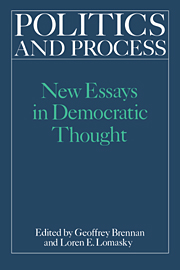Book contents
- Frontmatter
- Contents
- Acknowledgments
- List of contributors
- Introduction
- Chapter 1 The justification of democracy
- Chapter 2 Large numbers, small costs: the uneasy foundations of democratic rule
- Chapter 3 Evaluating the institutions of liberal democracy
- Chapter 4 Democracy: the public choice approach
- Chapter 5 The democratic order and public choice
- Chapter 6 Radical federalism: responsiveness, conflict, and efficiency
- Chapter 7 Contractarian presuppositions and democratic governance
- Chapter 8 In quest of the social contract
- Chapter 9 Rationality and the justification of democracy
- Chapter 10 The morality of democracy and the rule of law
- Index
Chapter 4 - Democracy: the public choice approach
Published online by Cambridge University Press: 29 September 2009
- Frontmatter
- Contents
- Acknowledgments
- List of contributors
- Introduction
- Chapter 1 The justification of democracy
- Chapter 2 Large numbers, small costs: the uneasy foundations of democratic rule
- Chapter 3 Evaluating the institutions of liberal democracy
- Chapter 4 Democracy: the public choice approach
- Chapter 5 The democratic order and public choice
- Chapter 6 Radical federalism: responsiveness, conflict, and efficiency
- Chapter 7 Contractarian presuppositions and democratic governance
- Chapter 8 In quest of the social contract
- Chapter 9 Rationality and the justification of democracy
- Chapter 10 The morality of democracy and the rule of law
- Index
Summary
Whether a society composed of individuals with diverse interests can be organized successfully by democratic means has been a major issue of philosophical debate at least since the time of ancient Greek civilization. That an upstart discipline like public choice could resolve in thirty-five years issues that have been debated for twenty-five hundred would seem improbable, and I will not be so presumptuous as to claim that it has. But it has the potential to shed new light on old questions, and may already have succeeded to some extent in doing so. I shall in this essay examine certain parts of the public choice literature to see what it has to offer to this long debate.
The chief assumption delineating the public choice approach is that political man and economic man are one and the same, each acting rationally in pursuit of his self-interest. They differ only with respect to the environments in which they act. Economic man encounters his fellow man in the marketplace, where they engage in mutually beneficial exchanges. Political man, either directly or through his representative, meets his fellow men in the assembly, where all engage simultaneously in what we call the “democratic process.” That the different contexts in which economic and political man act can have important implications concerning the normative properties of the consequences of these acts has been an important part of the public choice literature ever since Buchanan (1954a) first raised the issue some thirty-five years ago, and I shall return to it later.
- Type
- Chapter
- Information
- Politics and ProcessNew Essays in Democratic Thought, pp. 78 - 96Publisher: Cambridge University PressPrint publication year: 1989
- 4
- Cited by

